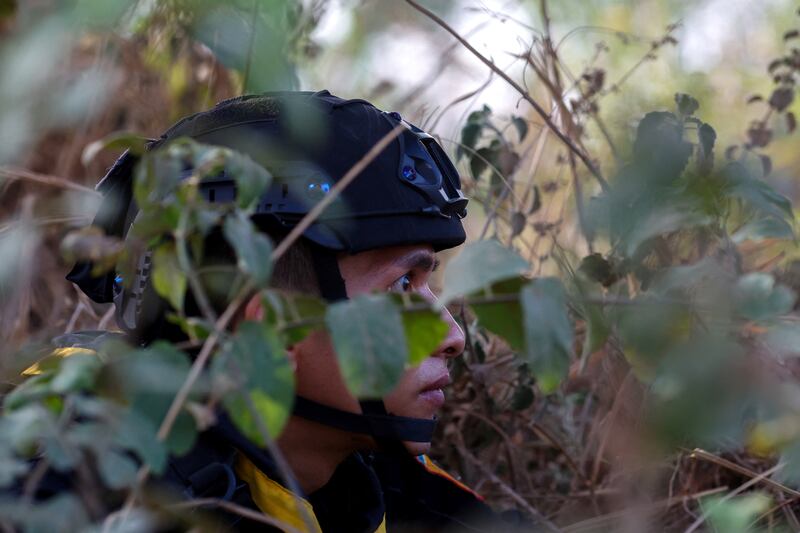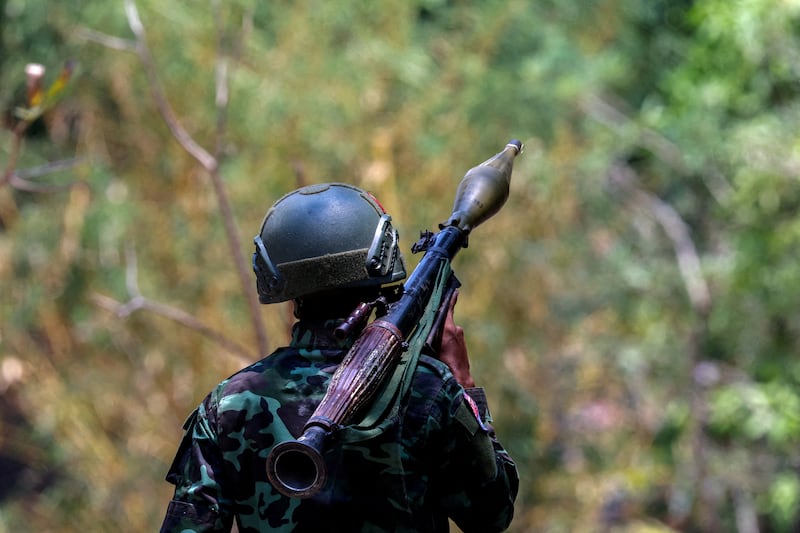Thailand is ready to act as a mediator in the conflict in Myanmar and help bring about a comprehensive resolution to fighting between junta forces and rebel groups, the top Thai diplomat said during a visit to the border Tuesday.
Foreign Minister Parnpree Bahiddha-Nukara revealed that initial discussions had already taken place with various parties in Myanmar, including the military government and ethnic groups, some of which are armed, and that Thailand was also looking to enlist support from the Association of Southeast Asian Nations (ASEAN).
“Some initial discussions have taken place with different groups, including the Myanmar government and the Myawaddy faction,” Parnpree said as he visited Mae Sot, a Thai district that sits on the border with Myanmar’s Kayin state.
“They haven’t had the time to discuss with us yet, but they are aware that we are ready to act as a mediator and to comprehensively resolve Myanmar’s issues to restore peace quickly.”
The foreign minister, who also serves as a deputy prime minister, emphasized the importance of ASEAN's involvement in resolving the crisis, given Myanmar's membership in the regional bloc. He said Thailand had communicated this stance to ASEAN and expected a response soon, potentially leading to a bloc-level meeting.
Parnpree, who was appointed by the prime minister on Monday as chairman of a special government committee to deal with the crisis in Myanmar, was accompanied on his visit to Mae Sot by Anutin Charnvirakul, a deputy prime minister who serves as interior minister, and Sutin Klungsang, the defense minister.
Officials said the visit underscored the gravity of the situation and the need for a coordinated response.

Earlier this month, the armed branch of the Karen National Union, called the Karen National Liberation Army, and its allies captured junta Infantry Battalion 275 in Myawaddy, a Burmese town that lies across the border from Mae Sot, on April 10.
Since then, rebel forces intercepted a junta convoy and injured over 100 soldiers on its way to recapture Myawaddy last week, resulting in the junta launching a helicopter attack two days later.
Fleeing Myanmar
The escalating violence in Myanmar has led to refugees fleeing across the border into Thailand, prompting authorities to monitor the situation and prepare for a potential influx of displaced individuals.
The Tak Provincial Public Health Office reported that 735 refugees who fled the conflict in Myanmar were in Tak, including 255 children. Of those, 114 people had received treatment in local hospitals as of Monday.
The Thai-Myanmar Border Command Center in Tak reported that fighting had occurred inside Myanmar about 1.5 to 12 km (1 to 7.5 miles) from the Thai border this week involving aerial bombings. It reported no impacts on the Thai side.

As the conflict in Myanmar shows no signs of abating, analysts and activists have called on the Thai government to develop a long-term strategy to address the crisis.
Chalida Tajaroensuk, director of the People’s Empowerment Foundation, said Thailand needed to look beyond immediate issues and engage with a broader range of stakeholders.
“The Myanmar military is faltering significantly and it’s almost certain that there will be a transition to a federal system. The Thai government is lacking a long-term plan, mostly addressing immediate issues,” Chalida told BenarNews.
“Thailand should elevate its stance, such as hosting a special ASEAN meeting to gather opinions from various countries, involving other sectors including civil society, the media, and even organizations from Myanmar.”
She urged the Thai government to expand its humanitarian assistance, stating, “Thailand should do more than just one humanitarian corridor because the impact on the Myanmar people is much greater. Multiple aid locations should be established across the country.
“We should look beyond Myawaddy and even engage in talks with the National Unity Government, as it’s clear that the military government cannot sustain itself any longer.”
Ruj Chuenban in Bangkok contributed to this report.
